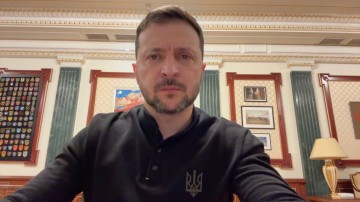It's evident that it was a cozy little house. There are carefully arranged textbooks of the older daughter on the shelves. And there is a teddy bear next to the crib of the younger one. She is one and a half. It all happened right at the threshold of the children's room. A Russian missile killed the girls' mother, 31-year-old Kateryna. The sky is now looking into the ruined house through the shattered ceiling. "How will I tell this to the children?" the father of the deceased is crying at the threshold, next to the flowerpots. The girls survived because the older one was at school, and the grandmother took the younger one for a walk. They survived physically. But how do you survive morally after such a loss?
I've just told you one recent tragedy from the life of Ukraine. It's only one day. However, all our days have become like this one due to the Russian invasion. This happened in Dnipro, a city that is not on the front line. This can happen anywhere, even deep within the country, hundreds of kilometers away from the active combat. World media often writes about such places in Ukraine: "everything is working, people go to work, it's calm." But that is precisely what the war is: when in a single moment, a lively street, a bus stop, or a shop turns into a place of a personal human tragedy. War is not about constant fire; it is about constant uncertainty of whether you will be alive in the next minute.
So, the question, "What do you think about the people in the world getting tired of reading news about the war in Ukraine?" that I often hear in international interviews, leaves me perplexed. If Ukrainian soldiers, despite fierce resistance against the enemy and the loss of their comrades, haven't got tired of liberating Ukrainian land, and if Ukrainians, despite their grief and tears, haven't got tired of defending their children and their future, how can people somewhere in a safe country get tired of reading the news?
Another question I'm frequently asked is, "What does Ukraine still want from the world, from other countries?"
Despite our deep gratitude to those who help us, it seems to me that it's time to shift the focus of this question. Not "What does Ukraine want?" but "What does the world and every one of its inhabitants want?" Do they want the aggressor to go unpunished and continue his actions? Do they want the new world order like this?
When someone says, "the war in Ukraine," we must clarify – it's the war in the global world. This is an attack on all international agreements, on human rights.
And if Ukraine "gets tired," the war won't stop. It will simply continue. Like a plague, like global pollution that wasn't stopped in time. And it will be near your borders, looming over cozy houses where your children live.
For the world to let itself get tired of the war in Ukraine is to let us die. Literally. Because the empire won't stop. It must be stopped. And that's what Ukraine is doing right now.
So, what do we want? We want everyone to know about it.
Not just Ukraine – we're all that same little family house with a missile hanging over it. We all need to hold up the sky above it.



